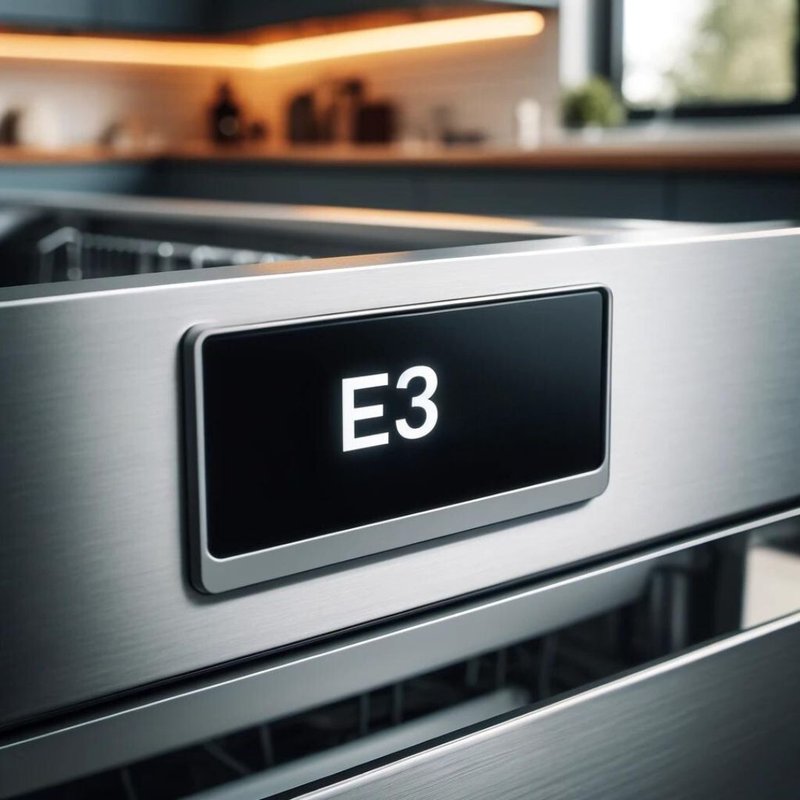
Error Code E3 can pop up for a few different reasons, and understanding what’s going on behind the stainless steel facade of your dishwasher can seem daunting. But don’t worry! While dishwashers are complex machines, breaking down the problem into bite-sized, understandable pieces can help you decide whether you can fix it yourself or if it’s time to call in the experts.
What Causes Bosch Dishwasher Error Code E3?
When you see Error Code E3 flashing at you, it’s like your dishwasher is trying to tell you it’s stuck on the sidelines, unable to play its full role. Simply put, this error usually means the water inside isn’t heating up as it should. Why does this matter? Well, much like how a shower is more refreshing when warm, hot water is crucial for effectively cleaning your dishes. Higher temperatures help dissolve detergent better and kill bacteria, giving you those squeaky clean results.
Now, onto the specifics. One frequent culprit for this error is a faulty heating element, which is kind of like the stove of your dishwasher. It’s responsible for heating the water to the right temperature. When it doesn’t work, you may as well be washing with cold tap water. Alternately, there might be an issue with the thermostat, the gadget that tells the dishwasher how warm the water should get. If it’s broken, the machine won’t know when to heat up the water or when to stop, leading to a false E3 code.
Another possibility? The problem could also lie with the wiring or connections. Just as a broken charger can leave your phone begging for juice, a disrupted connection can prevent power from reaching the heating components of your dishwasher. But regardless of the specific cause, the result is the same: your dishes aren’t coming out as clean as they should, and nobody wants that.
When You Can Fix Error Code E3 Yourself
Here’s the good news: some fixes might be within your grasp, even if you’re not the handiest person around. First, start by resetting your dishwasher. Unplug it or turn off the circuit breaker for about 5 minutes. This soft reboot can sometimes do wonders, much like restarting your computer when it’s acting up. Once you turn it back on, see if the error has vanished.
If you’re feeling a little more adventurous, you might take a peek inside. Before you do, ensure the dishwasher is disconnected from the power. Safety first, always! Then, locate the heating element at the bottom. It should look like a metal rod or loop. Check for visible damage or burns. If things look suspicious, it might be time to replace it. However, if you’re unsure or uncomfortable at any point, it’s best to consult the professionals.
Another home-friendly solution involves checking the dishwasher’s settings. Consult your user manual to ensure everything is set correctly for your water and detergent type. Sometimes, a mismatch here can cause the system to misread the water’s temperature, triggering the error.
Signs It’s Time to Call a Technician
Despite your best efforts, there will be times when the problem persists or feels beyond your ability. When should you call in a technician? If the error code keeps popping up or if there’s a burning smell, it’s definitely time to dial a pro. These could indicate more significant issues like wire damage or a more complex failure inside the machine.
Technicians have the tools and expertise to diagnose and repair problems that might be hidden from sight. When you find yourself scratching your head, relying on a professional can save you time and the frustration of repeated attempts that might not solve the underlying issue. Moreover, contacting a Bosch-certified technician ensures that the repair is done correctly and up to the manufacturer’s standards, extending the life of your appliance.
Lastly, if your dishwasher is under warranty, trying to fix it yourself might void the coverage. By having a professional handle the repair, you maintain the warranty’s validity and secure any potential coverage for the cost.
Preventing Future Error Code E3 Issues
Once you’ve dealt with the pesky E3 error, you might think, “Never again!” Fortunately, some preventative measures can help you avoid seeing it in the future. Regular maintenance is key. Run an empty cycle with dishwasher cleaner every month to help prevent scale buildup that can affect heating elements. This is like giving your machine a refreshing spa day, clearing out any gunk that might interfere with its operation.
Water quality can also play a role. If your water’s mineral content is high, consider installing a water softener. Hard water can lead to mineral deposits that affect your dishwasher’s heating coil, much like how calcium buildup can clog and slow a showerhead.
Finally, stay familiar with your dishwasher’s manual; it’s a treasure chest of advice specific to your model. Simply knowing how your machine is supposed to operate can help you identify when something goes awry, and knowing what settings to use can prevent stress on various components.
So there you have it! Handling the E3 error doesn’t have to be a monstrous task. With a little knowledge and the occasional professional help, your Bosch dishwasher will keep your plates gleaming for years to come.